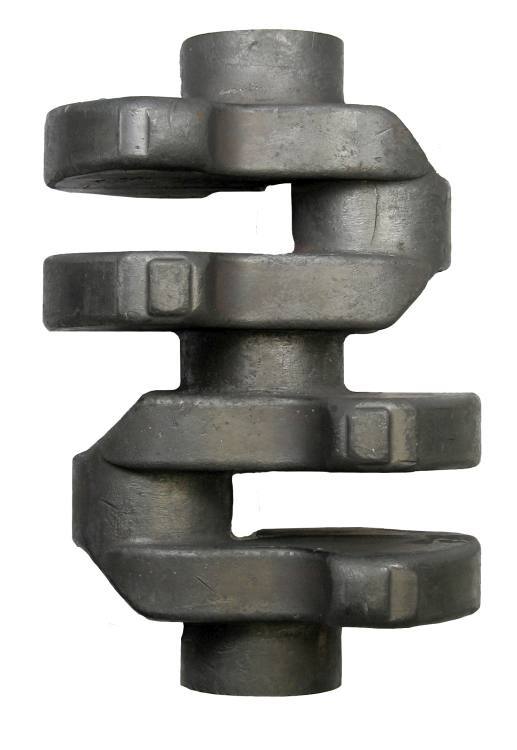The aim of the new research project is ambitious: Today, 11.5 kilograms of raw material are necessary to produce a crankshaft with a final weight of 7 kilograms. IPH engineers are planning to decrease the amount of raw material down to 8.75 kilograms and obtain the same result. This means a reduction of the proportion of flash to excess material – that occurs as a waste product during forging – from 54% to 15%. Since material costs account for half the total costs of manufacturing a crankshaft, the reduction of flash might save companies a lot of money.
To achieve this goal, IPH engineers intend to forge the material very close to the final geometry within the preforming steps of the forging process. Technically, this is possible due to a method called multi-directional forging. This method has been developed at IPH in recent years. In order to disperse the material in the forging die as good as possible, the material forming is done simultaneously from different directions. So far, the method has only been tested under laboratory conditions but not been used in the industry. Yet, adjusting the tool to the components it is supposed to produce is still too complex. The tools are too inflexible to manufacture different parts with one of these complex tools. In cooperation with industrial companies from four countries and a research institute from Hanover, IPH is continuing the development of the multi-directional forging method. Further steps include a modularization of the multidirectional tool. Thereby, different types of twin-cylinder crankshafts shall be produced.
In their new research project, IPH engineers consider the entire process chain of manufacturing a two-cylinder crankshaft. Different deformation stages are designed and simulated. The local inductive reheating of the component during fabrication is also being examined. Local reheating has not been used in the industry yet and will therefore be investigated as part of the research project. The research engineers are trying to determine whether a reheating of the component during the forging process makes sense – and if it might be more energy efficient in the end.
In the project, the Institute of Electro technology and EMA-TEC, a manufacturer of induction heating systems, develop the heating process and the facilities for the local reheating of a complicated geometry. The crankshaft geometry is contributed by the forging company Omtas Otomotiv Tranmisyon Aksami. Omtas is also going to forge the prototypes in the project, whereas the mold constructor Aurrenak will produce the multi-directional tool. To check whether the produced crankshafts show the same characteristics as conventionally produced ones, Metav-Cercetare Dezvoltare will carry out a material analysis.
Used in cars, motorcycles, trucks and ships, forged components like crankshafts must withstand high strains. Increasing, the complexity of the geometry of such a forged part results in a more challenging production process and in additional costs. Furthermore, only half of the raw material actually makes up the final product. The rest is excess material. This so-called flash must be removed from the product at the end of the manufacturing process. Since the material costs account for a high percentage of the total costs, companies are very interested in producing their products using less material.
The research project "Resource efficient forging process chain for high duty complicated parts" (REForCh) is funded by the European Union with about 1.1 million euros. In addition to IPH and the Institute of Electro technology (ETP) of Leibniz University Hanover, a number of companies are participating in the two-year project: EMA-TEC GmbH (Germany), Aurrenak S. Coop. (Spain), Metav-Cercetare Dezvoltare S. A. (Romania) and Omtas Otomotiv Tranmisyon Aksami San Ve Tic. A. S. (Turkey). The research project runs until 30th of September 2014.




